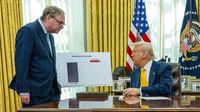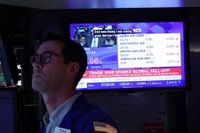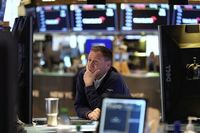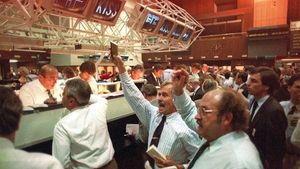On April 7, 2025, the New York Stock Exchange opened lower following Donald Trump's comments regarding trade tariffs, which have continued to rattle investors. The Dow Jones index fell by 1,191.59 points, or 3.11%, settling at 37,123.27 points. The broader Standard & Poor's 500 dropped 3.36% to 4,903.71 points, while the Nasdaq Composite saw a decline of 3.90%, or 608.53 points, to 14,979.26 points.
The downturn reflects a broader trend of market instability as Trump maintains a hardline stance on his trade policies. The VIX volatility index, which measures anticipated volatility in the S&P 500 over the next 30 days, surged to 60, marking its highest level since August 2024. Investors are increasingly concerned about the potential for a recession, with JP Morgan estimating the risk at 60%.
Trump's recent tariff policies have sent shockwaves through global markets. On April 5, he imposed a universal 10% additional tax on all products imported into the United States, a move that has prompted retaliatory actions from other nations. The tax rate is set to increase on April 9, with the European Union facing a 20% tariff and China a staggering 34% tariff on U.S. imports. In response, China announced its own tariffs on American goods, effective April 10, further escalating tensions.
As the markets reacted to these developments, major companies felt the impact. Nike shares fell by 5.69%, while both Apple and Tesla saw declines of 5.69% and 10%, respectively. Financial services companies also experienced significant losses, with American Express down 4.07%, Mastercard losing 3.69%, and Visa dropping 4.13%.
Globally, the situation wasn't any better. The Paris Stock Exchange experienced a decline of over 5%, while London’s market fell by more than 4.5%. The Hong Kong stock exchange plummeted by 13.22%, marking its most significant drop since the Asian financial crisis of 1997.
Amidst the chaos, Trump urged investors not to panic. "Don't be weak! Don't be stupid! Be strong, brave, and patient, and greatness will come," he posted on his Truth Social platform just before the market opened. Yet, the reality of the situation continues to weigh heavily on traders.
Market analysts have expressed growing concerns about the economic outlook. Adam Sarhan from 50 Park Investments stated, "The reason the market is down is very clear; it needs to reassess the new paradigm we find ourselves in." The ongoing trade war has led to fears of weaker earnings, higher inflation, and increased interest rates, all of which contribute to a climate of uncertainty.
In the midst of this turmoil, a brief moment of hope emerged when erroneous reports circulated that Trump was considering a 90-day pause on the implementation of tariffs. CNBC reported that Kevin Hassett, a senior economic advisor, had suggested this pause during an interview. However, the White House quickly denied these claims, stating that Hassett did not make such statements and that Trump was resolute in his approach to trade negotiations.
Despite the brief rally in the markets following the initial report, the Dow Jones and Nasdaq fell back into the red as the reality of the administration's stance set in once more. "If you look at the history of the markets and other crises, none have been as avoidable and self-inflicted as the current crisis," noted Jay Woods of Freedom Capital Markets.
As the day unfolded, the volatility continued to dominate trading floors. The yield on 10-year U.S. government bonds rose to 4.10%, up from 3.99% at the previous week's close, as investors sought refuge in safer assets amidst the chaos.
In the tech sector, the so-called "Fabulous Seven" companies showed mixed results. Tesla fell by 5.07%, while Alphabet dipped by 0.16%. Conversely, Amazon and Meta saw slight gains, rising by 1.68% and 0.96%, respectively. Apple, however, faced a 3.19% decline, reflecting the overall negative sentiment surrounding the tech industry.
Automakers also took a hit, with General Motors down 3.42%, Ford losing 3.84%, and Stellantis dropping 3.55%. The imposition of additional tariffs on vehicles manufactured outside the U.S. has raised concerns about the future of the auto industry.
Cryptocurrency-related stocks were not spared from the downturn either. Coinbase fell by 4.34%, Robinhood dropped by 0.17%, and Strategy saw a steep decline of 6.22%. The overall sentiment in the crypto market has been bearish, exacerbated by the recent plunge in Bitcoin prices.
As the day progressed, it became clear that the global financial landscape was in turmoil, with markets around the world responding negatively to the latest developments in U.S. trade policy. Investors are left to navigate a complex web of uncertainty, with many questioning the long-term implications of Trump's aggressive tariff strategies.
In summary, the events of April 7, 2025, serve as a stark reminder of the fragility of global markets in the face of political decisions. As traders brace for what lies ahead, one thing is certain: the repercussions of the ongoing trade war will be felt for some time to come.







